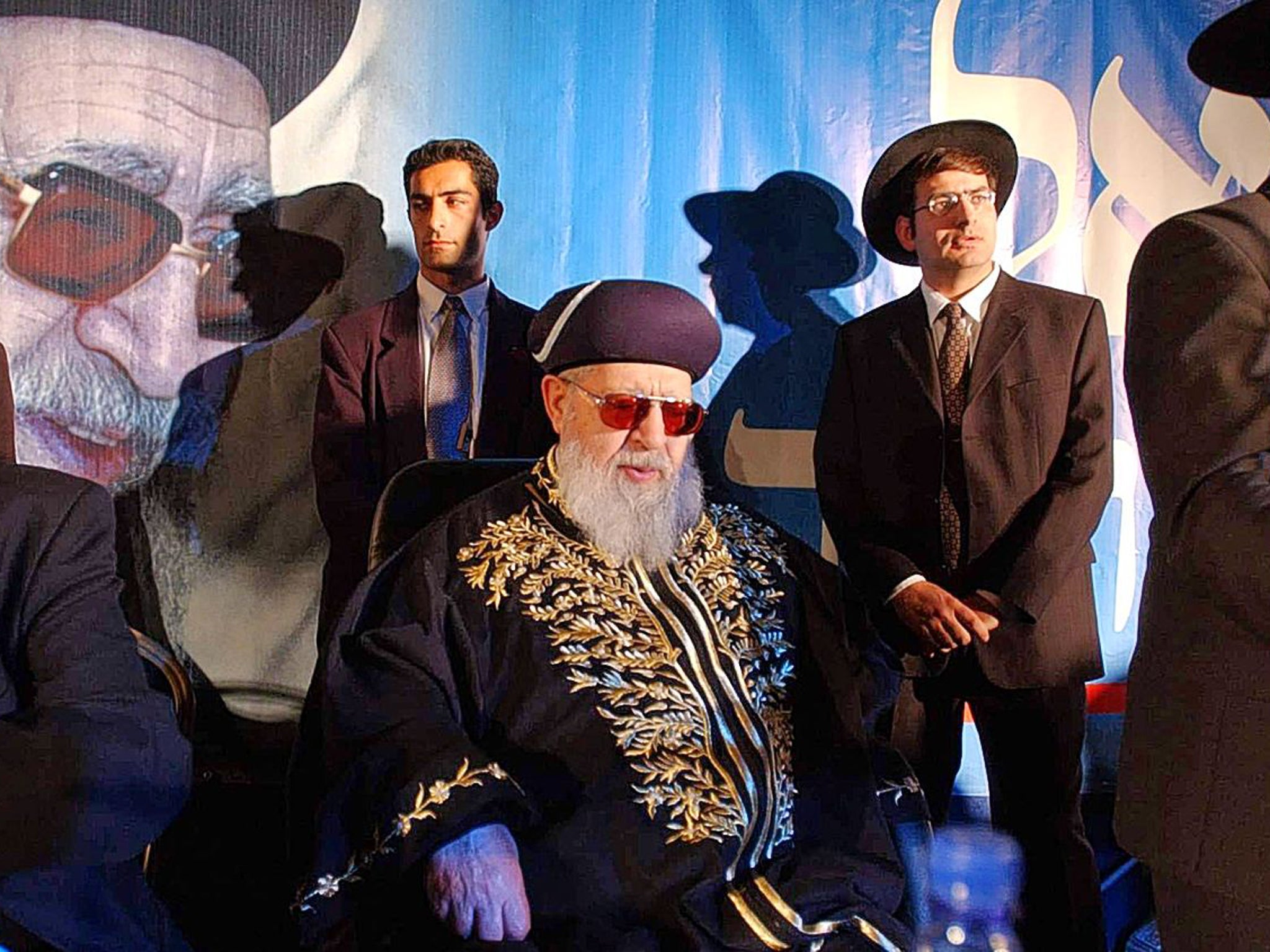Rabbi Ovadia Yosef Religious leader who became a kingmaker

Your support helps us to tell the story
From reproductive rights to climate change to Big Tech, The Independent is on the ground when the story is developing. Whether it's investigating the financials of Elon Musk's pro-Trump PAC or producing our latest documentary, 'The A Word', which shines a light on the American women fighting for reproductive rights, we know how important it is to parse out the facts from the messaging.
At such a critical moment in US history, we need reporters on the ground. Your donation allows us to keep sending journalists to speak to both sides of the story.
The Independent is trusted by Americans across the entire political spectrum. And unlike many other quality news outlets, we choose not to lock Americans out of our reporting and analysis with paywalls. We believe quality journalism should be available to everyone, paid for by those who can afford it.
Your support makes all the difference.To his supporters, Rabbi Ovadia Yosef was a spiritual sage who empowered disenfranchised Sephardic Jews. To secular Israelis he was a medieval figure in flowing robes occasionally given to bizarre rants. But through his control of the Shas party Yosef wielded influence over all Israelis. His death leaves a vacuum that could see the party splinter, reshaping Israeli politics.
Yosef, a religious scholar and spiritual leader of Israeli Jews of Middle Eastern descent, spent his lifetime transforming the downtrodden Sephardic community into a potent political force. Yet the 93-year-old rabbi left no clear successor, raising questions about the future of Shas.
Born in Baghdad in 1920, Yosef was four when his family moved to Jerusalem. His abilities and rebellious nature emerged early. As a student, he chafed under the strict rule of his European rabbinical instructors, writing conflicting opinions based on Sephardic tradition while still a teenager. His insistence that Sephardic tradition is as valid as the Ashkenazi, or European, version of Judaism spawned a religious and cultural awakening. Sephardic Jews make up roughly half of Israel's Jewish population but the community was long impoverished and faced discrimination from Ashkenazi Jews, who dominated government and religious institutions.
Yosef came to prominence when he served as Israel's chief Sephardic rabbi from 1972 to 1983. While he was revered by his followers, his critics said he exacerbated tensions. His ornate outfit, with a gold-trimmed black cape and upswept hat, his ever-present dark glasses and habitually slurred speech made him an easy target for caricaturists. He would greet visitors, whether followers or prime ministers, with a playful slap to the face.
Yosef parlayed his religious authority into political power, founding Shas in the early 1980s. The party won four seats in the 120-seat parliament in its first election, in 1984, but at its peak won 17 seats in 1999, making it the third-largest party. Even after being hit by scandals, it remained a mid-sized party that delivered a string of prime ministers their majority. Shas currently has 11 seats.
For three decades, Yosef held the final word over party decisions, its leaders seeking his guidance in all matters. It won huge government funding for schools, charities and seminaries that became a source of power and patronage, as well as a cause of resentment among the secular public.
The author of dozens of books about Jewish law and practice, Yosef was a master of communication. His weekly sermon packed his neighbourhood synagogue, overflow audiences listening outside on loudspeakers to his often earthy remarks. In recent years the sermons had been broadcast on television. His influence reached beyond the party, and he was known for fierce statements that offended widely disparate segments of society, including Holocaust survivors, gays, Palestinians and secular Jews. During a sermon in 2010 he said the Palestinian President Mahmoud Abbas should "perish from the world" and described Palestinians as "evil, bitter enemies of Israel." He later apologised.
In 2007 he said that Israeli soldiers died in battle because they were not religious enough and said the victims of Hurricane Katrina in the US suffered "because they have no God."
Yet Yosef's could be a voice of moderation. On questions of war and peace, he made his biggest waves by ruling that Israel may give back parts of the West Bank in exchange for peace, invoking the Jewish concept that preserving life is the highest commandment. The ruling countered decrees by other rabbis, who declared that no Jew had a right to hand over any part of the biblical Land of Israel to a non-Jew for any reason.
But in later years, he appeared to retreat. He called for the then-Prime Minister Ariel Sharon to be struck down by illness after Israel's withdrawal from the Gaza Strip in 2005. Sharon suffered a stroke in 2006 and remains in a coma. In recent elections Shas hadaligned itself with parties opposing territorial concessions.
Earlier this year, Yosef criticised the strict prohibitions issued by hard-line rabbis. "That's not the way of the Torah," he said. "The way of the Torah is to search and find ways to solutions, to make it easier for the people of Israel and not make it harder for them."
Ovadia Yosef, rabbi and politician: born Baghdad 24 September 1920; Margalit Fattal (died 1994; 11 children); died Jerusalem 7 October 2013.
Subscribe to Independent Premium to bookmark this article
Want to bookmark your favourite articles and stories to read or reference later? Start your Independent Premium subscription today.
Join our commenting forum
Join thought-provoking conversations, follow other Independent readers and see their replies
Comments